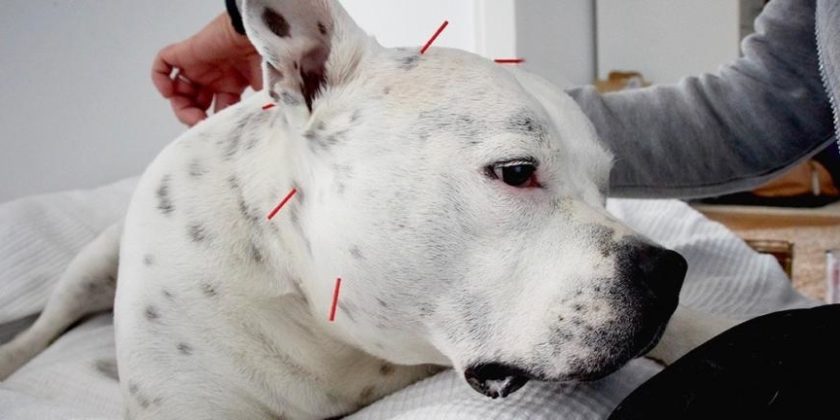When learning about my patients, I may ask if they have children. And I may hear the answer, “No, though I have two dogs.” We can love our pets the same way we do our children, and when they get sick or are in pain we want to know all the options for care. I often have patients ask me if I can do acupuncture on their pets or large animals. I tell them that I’m not trained in veterinary acupuncture and typically refer to Chelsea Animal Hospital in Chelsea, VT. Knowing the anatomy of an animal would be a different type of education than I’ve had so I avoid putting needles in them. Many people are interested in the various forms of medical care for their bodies, and the same is surely true for their animals.
In China, acupuncture has been used to manage illness of animals for thousands of years. The International Veterinary Acupuncture Society is a good resource of information. It reports that “acupuncture is indicated for functional problems such as those that involve paralysis, noninfectious inflammation (such as allergies), and pain. For small animals, the following are some of the general conditions that may be treated with acupuncture:
- Musculoskeletal problems, such as arthritis, intervertebral disk disease, or traumatic nerve injury
- Respiratory problems, such as feline asthma
- Skin problems, such as lick granulomas and allergic dermatitis
- Gastrointestinal problems, such as diarrhea
- Selected reproductive problems
For large animals, acupuncture is again commonly used for functional problems. Some of the general conditions where it might be applied are the following:
- Musculoskeletal problems, such as sore backs and downer cow syndrome
- Neurological problems, such as facial paralysis
- Skin problems, such as allergic dermatitis
- Respiratory problems, such as heaves and “bleeders”
- Gastrointestinal problems, such as nonsurgical colic
- Selected reproductive problems
In addition, regular acupuncture treatment can treat minor sports injuries as they occur and help to keep muscles and tendons resistant to injury. World-class professional and amateur athletes often use acupuncture as a routine part of their training. If your animals are involved in any athletic endeavor, such as racing, jumping, or showing, acupuncture can help them keep in top physical condition.”
Along with modern pharmaceuticals and surgery, many veterinarians use various other, more natural forms of correcting the body. Acupuncture is one of these, but others include: chiropractic, aromatherapy, herbal medicine, homeopathy, and nutritional therapy. These are the few more common types of treatments that I’m aware of, though you may learn more from talking to your veterinarian.
If you are unaware of chiropractic care, this is a non-invasive, manual technique that affects the relationship between the nervous system and spinal cord. If there is a misalignment of bones, this may cause pain and affect the functioning of the nervous system. By correcting this misalignment, will allow for the more optimal working of the body.
As an alternative to drugs, plant-based materials are commonly used for health care. This may be in the form of essential oils with aromatherapy, which can affect the mental and emotional well being of your animal, along with the physical. Many drugs come from isolating and concentrating specific components of natural herbs, but herbal medicine recognizes that using the plant in its whole form can be just as beneficial without the potential side effects. Homeopathy is based on the idea that “like cures like” and uses minute amounts of plants, minerals, drugs, viruses, or bacteria diluted and dissolved in alcohol or water. Using food as medicine can also be a very simple way to support the body, such as reducing inflammation or supporting proper organ function.
Again, please speak to your veterinarian for guidance treating your small or large animals, but I thought I’d share here some of the various natural forms of medicine that are commonly used in veterinary care.

